ACC2006 Company Law: Reflective Journal on Alternative Structures
VerifiedAdded on 2023/06/07
|15
|1932
|316
Journal and Reflective Writing
AI Summary
This reflective journal provides an overview of various business structures, including sole traders, companies, partnerships, trusts, and associations, within the context of company law. It discusses the importance of incorporation, company constitutions, and the roles and duties of company promoters, directors, and officers. The journal also touches upon corporate governance, financing methods such as equity and debt, and members' remedies for oppressive conduct. The author emphasizes the significance of understanding these legal and structural aspects for effective business management and compliance. The assignment also references several articles and publications to support the arguments and analysis.
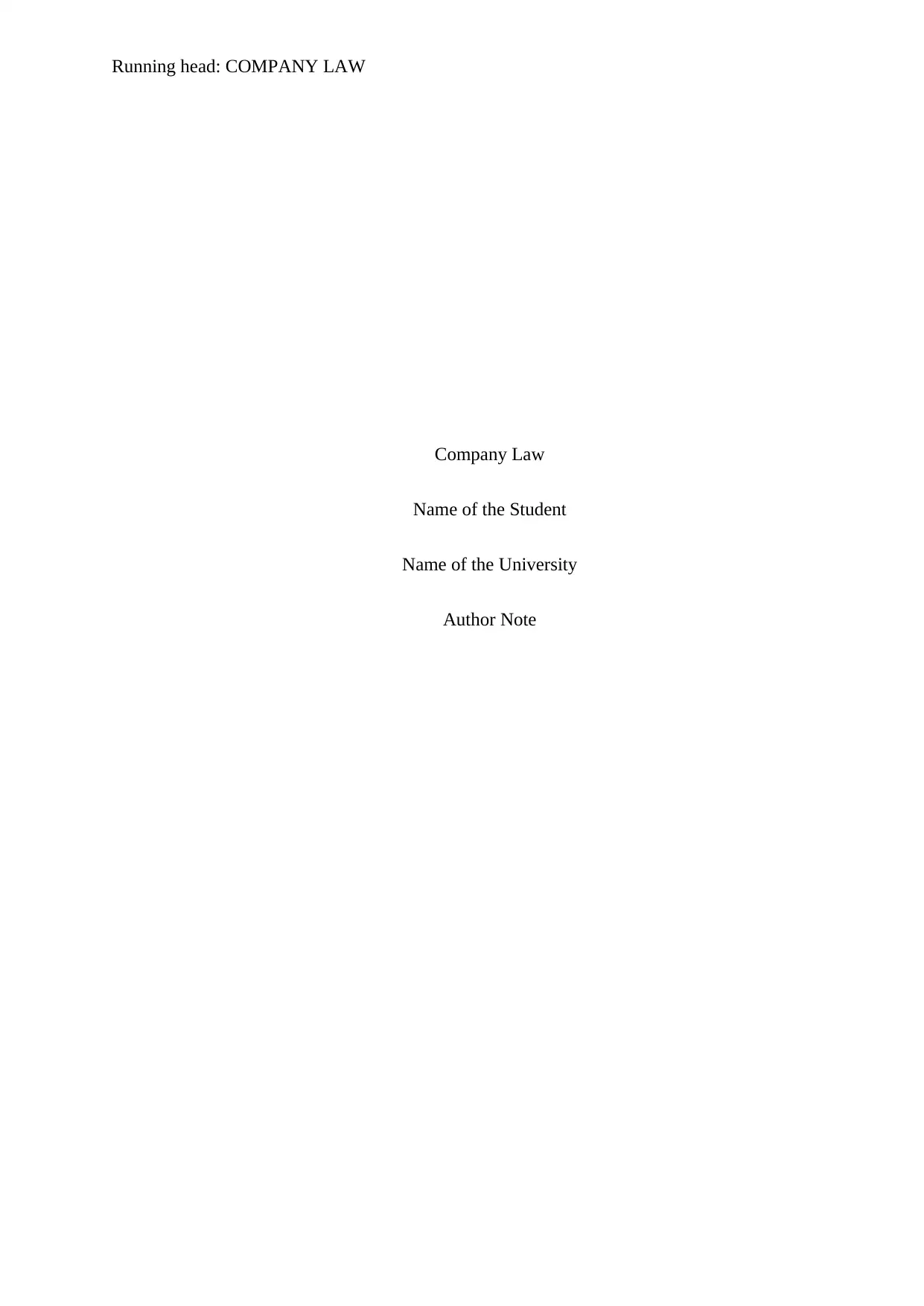
Running head: COMPANY LAW
Company Law
Name of the Student
Name of the University
Author Note
Company Law
Name of the Student
Name of the University
Author Note
Paraphrase This Document
Need a fresh take? Get an instant paraphrase of this document with our AI Paraphraser
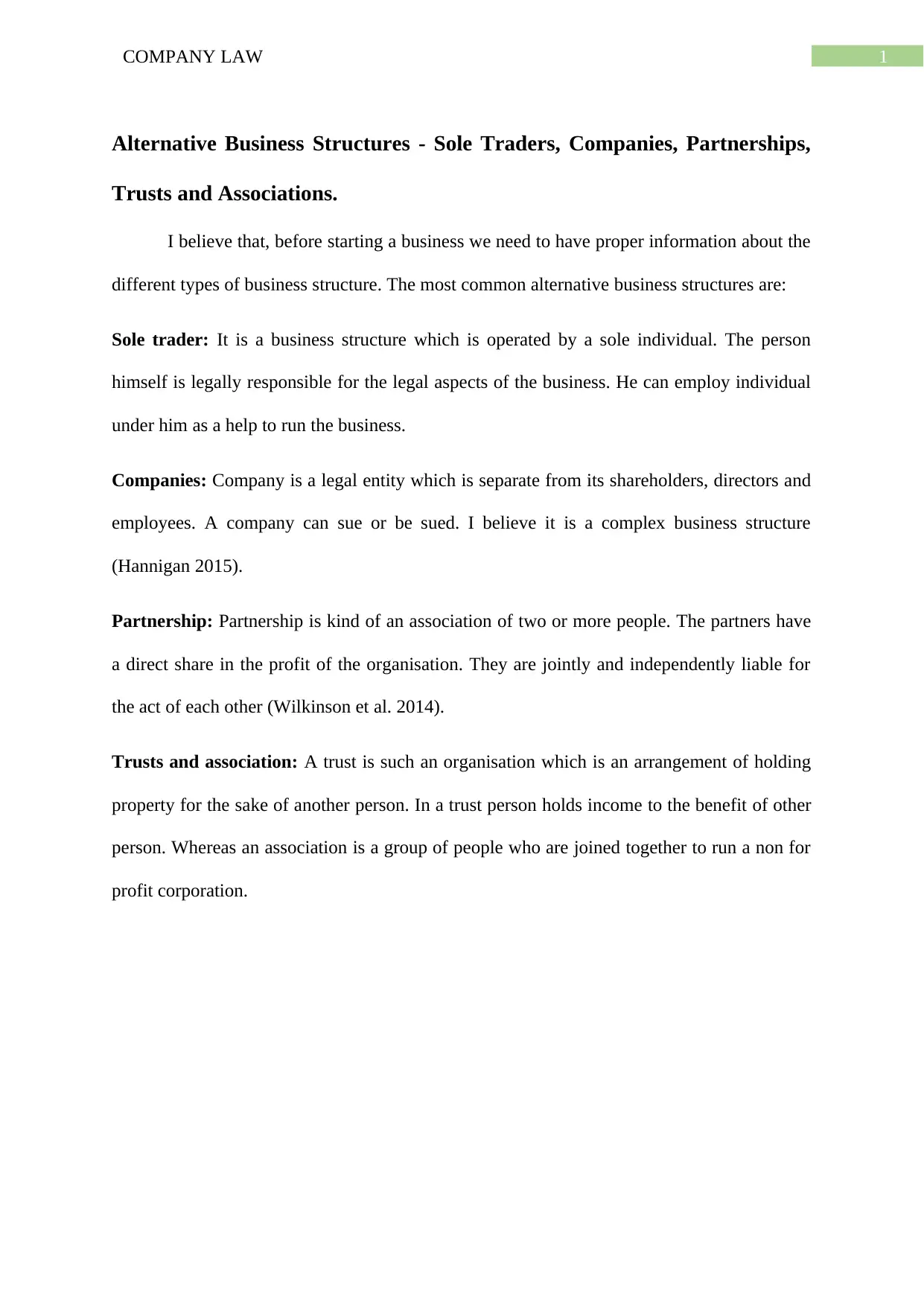
1COMPANY LAW
Alternative Business Structures - Sole Traders, Companies, Partnerships,
Trusts and Associations.
I believe that, before starting a business we need to have proper information about the
different types of business structure. The most common alternative business structures are:
Sole trader: It is a business structure which is operated by a sole individual. The person
himself is legally responsible for the legal aspects of the business. He can employ individual
under him as a help to run the business.
Companies: Company is a legal entity which is separate from its shareholders, directors and
employees. A company can sue or be sued. I believe it is a complex business structure
(Hannigan 2015).
Partnership: Partnership is kind of an association of two or more people. The partners have
a direct share in the profit of the organisation. They are jointly and independently liable for
the act of each other (Wilkinson et al. 2014).
Trusts and association: A trust is such an organisation which is an arrangement of holding
property for the sake of another person. In a trust person holds income to the benefit of other
person. Whereas an association is a group of people who are joined together to run a non for
profit corporation.
Alternative Business Structures - Sole Traders, Companies, Partnerships,
Trusts and Associations.
I believe that, before starting a business we need to have proper information about the
different types of business structure. The most common alternative business structures are:
Sole trader: It is a business structure which is operated by a sole individual. The person
himself is legally responsible for the legal aspects of the business. He can employ individual
under him as a help to run the business.
Companies: Company is a legal entity which is separate from its shareholders, directors and
employees. A company can sue or be sued. I believe it is a complex business structure
(Hannigan 2015).
Partnership: Partnership is kind of an association of two or more people. The partners have
a direct share in the profit of the organisation. They are jointly and independently liable for
the act of each other (Wilkinson et al. 2014).
Trusts and association: A trust is such an organisation which is an arrangement of holding
property for the sake of another person. In a trust person holds income to the benefit of other
person. Whereas an association is a group of people who are joined together to run a non for
profit corporation.

2COMPANY LAW
(Source: Aldred 2018)
(Source: Aldred 2018)
⊘ This is a preview!⊘
Do you want full access?
Subscribe today to unlock all pages.

Trusted by 1+ million students worldwide
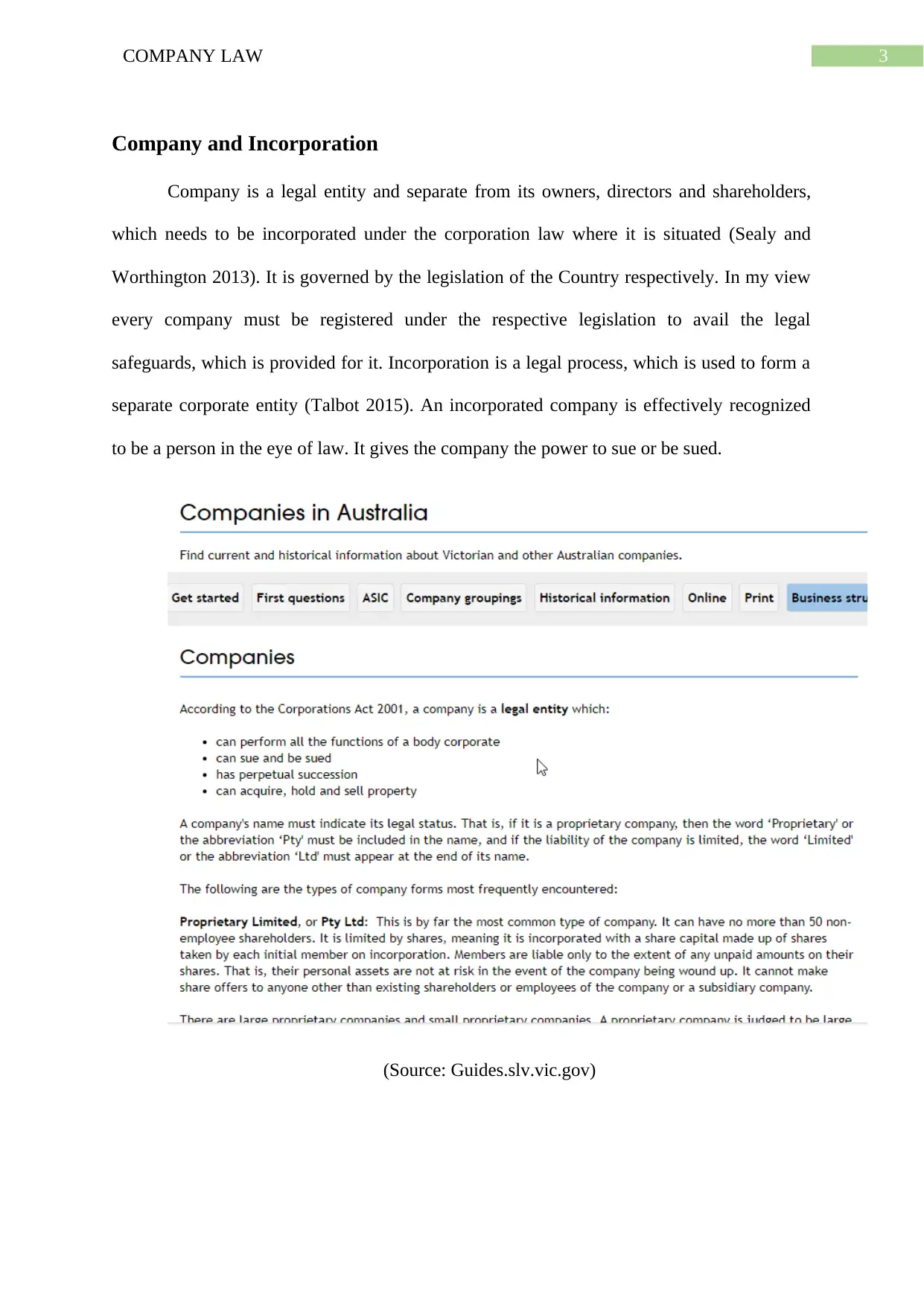
3COMPANY LAW
Company and Incorporation
Company is a legal entity and separate from its owners, directors and shareholders,
which needs to be incorporated under the corporation law where it is situated (Sealy and
Worthington 2013). It is governed by the legislation of the Country respectively. In my view
every company must be registered under the respective legislation to avail the legal
safeguards, which is provided for it. Incorporation is a legal process, which is used to form a
separate corporate entity (Talbot 2015). An incorporated company is effectively recognized
to be a person in the eye of law. It gives the company the power to sue or be sued.
(Source: Guides.slv.vic.gov)
Company and Incorporation
Company is a legal entity and separate from its owners, directors and shareholders,
which needs to be incorporated under the corporation law where it is situated (Sealy and
Worthington 2013). It is governed by the legislation of the Country respectively. In my view
every company must be registered under the respective legislation to avail the legal
safeguards, which is provided for it. Incorporation is a legal process, which is used to form a
separate corporate entity (Talbot 2015). An incorporated company is effectively recognized
to be a person in the eye of law. It gives the company the power to sue or be sued.
(Source: Guides.slv.vic.gov)
Paraphrase This Document
Need a fresh take? Get an instant paraphrase of this document with our AI Paraphraser
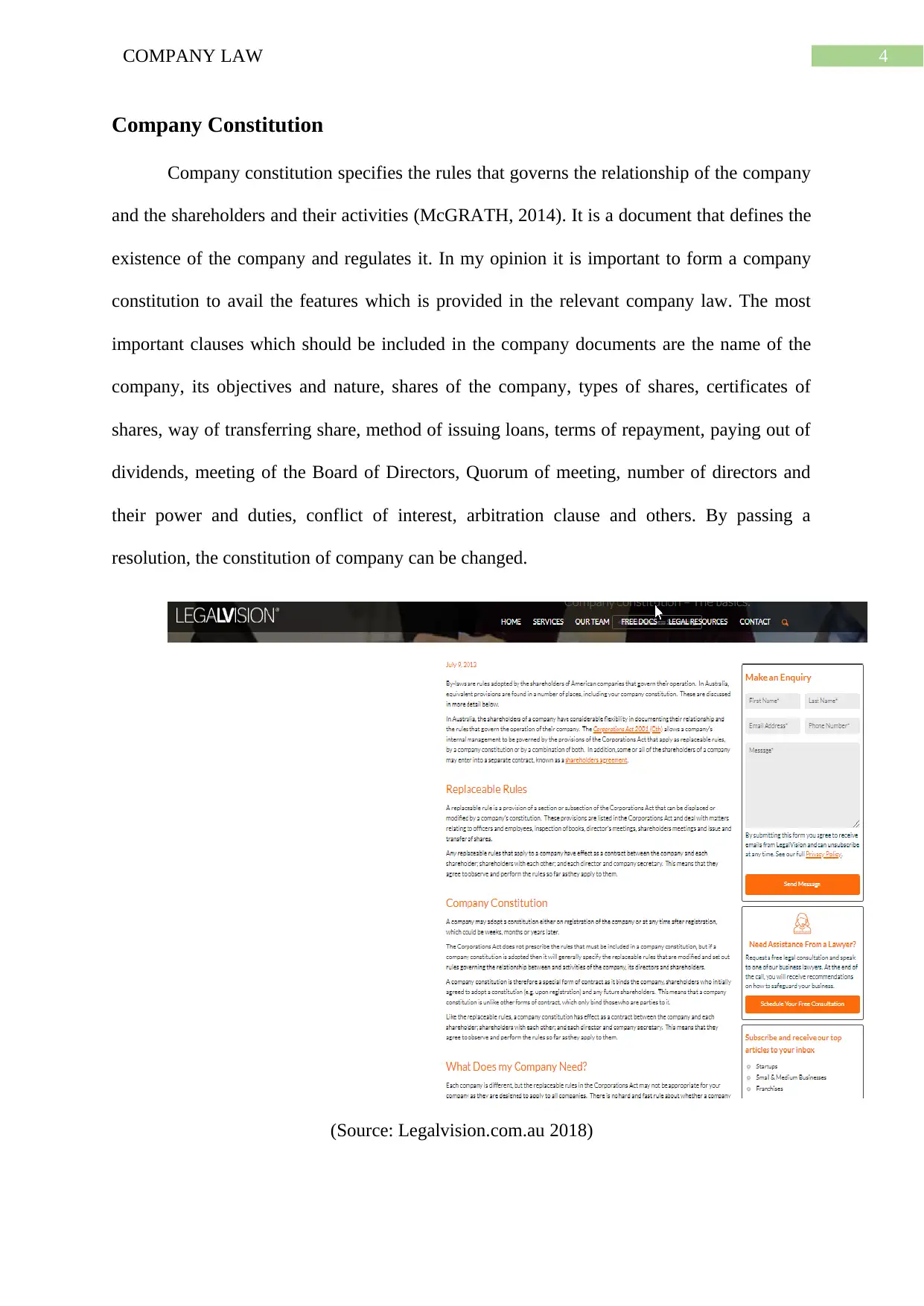
4COMPANY LAW
Company Constitution
Company constitution specifies the rules that governs the relationship of the company
and the shareholders and their activities (McGRATH, 2014). It is a document that defines the
existence of the company and regulates it. In my opinion it is important to form a company
constitution to avail the features which is provided in the relevant company law. The most
important clauses which should be included in the company documents are the name of the
company, its objectives and nature, shares of the company, types of shares, certificates of
shares, way of transferring share, method of issuing loans, terms of repayment, paying out of
dividends, meeting of the Board of Directors, Quorum of meeting, number of directors and
their power and duties, conflict of interest, arbitration clause and others. By passing a
resolution, the constitution of company can be changed.
(Source: Legalvision.com.au 2018)
Company Constitution
Company constitution specifies the rules that governs the relationship of the company
and the shareholders and their activities (McGRATH, 2014). It is a document that defines the
existence of the company and regulates it. In my opinion it is important to form a company
constitution to avail the features which is provided in the relevant company law. The most
important clauses which should be included in the company documents are the name of the
company, its objectives and nature, shares of the company, types of shares, certificates of
shares, way of transferring share, method of issuing loans, terms of repayment, paying out of
dividends, meeting of the Board of Directors, Quorum of meeting, number of directors and
their power and duties, conflict of interest, arbitration clause and others. By passing a
resolution, the constitution of company can be changed.
(Source: Legalvision.com.au 2018)
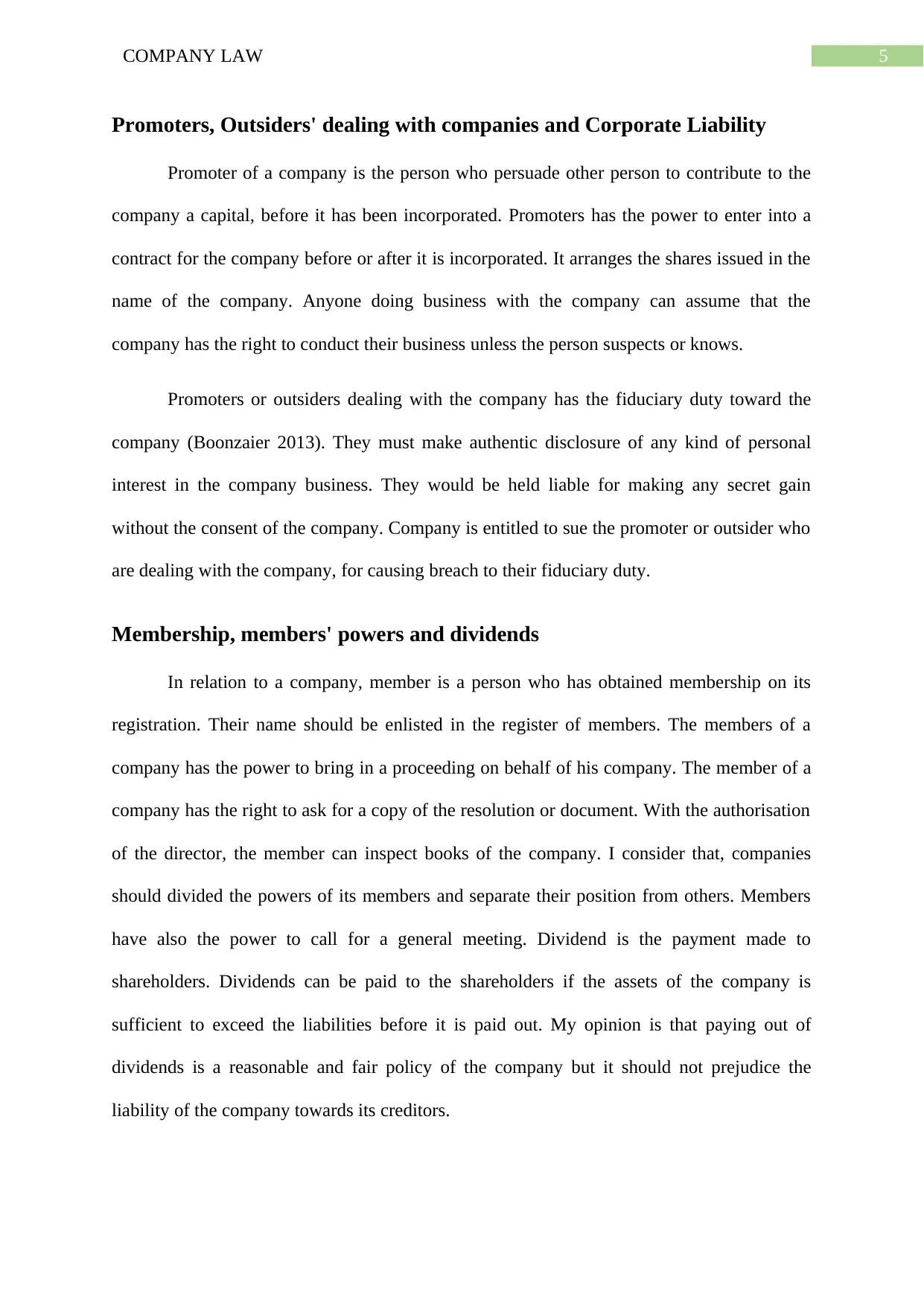
5COMPANY LAW
Promoters, Outsiders' dealing with companies and Corporate Liability
Promoter of a company is the person who persuade other person to contribute to the
company a capital, before it has been incorporated. Promoters has the power to enter into a
contract for the company before or after it is incorporated. It arranges the shares issued in the
name of the company. Anyone doing business with the company can assume that the
company has the right to conduct their business unless the person suspects or knows.
Promoters or outsiders dealing with the company has the fiduciary duty toward the
company (Boonzaier 2013). They must make authentic disclosure of any kind of personal
interest in the company business. They would be held liable for making any secret gain
without the consent of the company. Company is entitled to sue the promoter or outsider who
are dealing with the company, for causing breach to their fiduciary duty.
Membership, members' powers and dividends
In relation to a company, member is a person who has obtained membership on its
registration. Their name should be enlisted in the register of members. The members of a
company has the power to bring in a proceeding on behalf of his company. The member of a
company has the right to ask for a copy of the resolution or document. With the authorisation
of the director, the member can inspect books of the company. I consider that, companies
should divided the powers of its members and separate their position from others. Members
have also the power to call for a general meeting. Dividend is the payment made to
shareholders. Dividends can be paid to the shareholders if the assets of the company is
sufficient to exceed the liabilities before it is paid out. My opinion is that paying out of
dividends is a reasonable and fair policy of the company but it should not prejudice the
liability of the company towards its creditors.
Promoters, Outsiders' dealing with companies and Corporate Liability
Promoter of a company is the person who persuade other person to contribute to the
company a capital, before it has been incorporated. Promoters has the power to enter into a
contract for the company before or after it is incorporated. It arranges the shares issued in the
name of the company. Anyone doing business with the company can assume that the
company has the right to conduct their business unless the person suspects or knows.
Promoters or outsiders dealing with the company has the fiduciary duty toward the
company (Boonzaier 2013). They must make authentic disclosure of any kind of personal
interest in the company business. They would be held liable for making any secret gain
without the consent of the company. Company is entitled to sue the promoter or outsider who
are dealing with the company, for causing breach to their fiduciary duty.
Membership, members' powers and dividends
In relation to a company, member is a person who has obtained membership on its
registration. Their name should be enlisted in the register of members. The members of a
company has the power to bring in a proceeding on behalf of his company. The member of a
company has the right to ask for a copy of the resolution or document. With the authorisation
of the director, the member can inspect books of the company. I consider that, companies
should divided the powers of its members and separate their position from others. Members
have also the power to call for a general meeting. Dividend is the payment made to
shareholders. Dividends can be paid to the shareholders if the assets of the company is
sufficient to exceed the liabilities before it is paid out. My opinion is that paying out of
dividends is a reasonable and fair policy of the company but it should not prejudice the
liability of the company towards its creditors.
⊘ This is a preview!⊘
Do you want full access?
Subscribe today to unlock all pages.

Trusted by 1+ million students worldwide
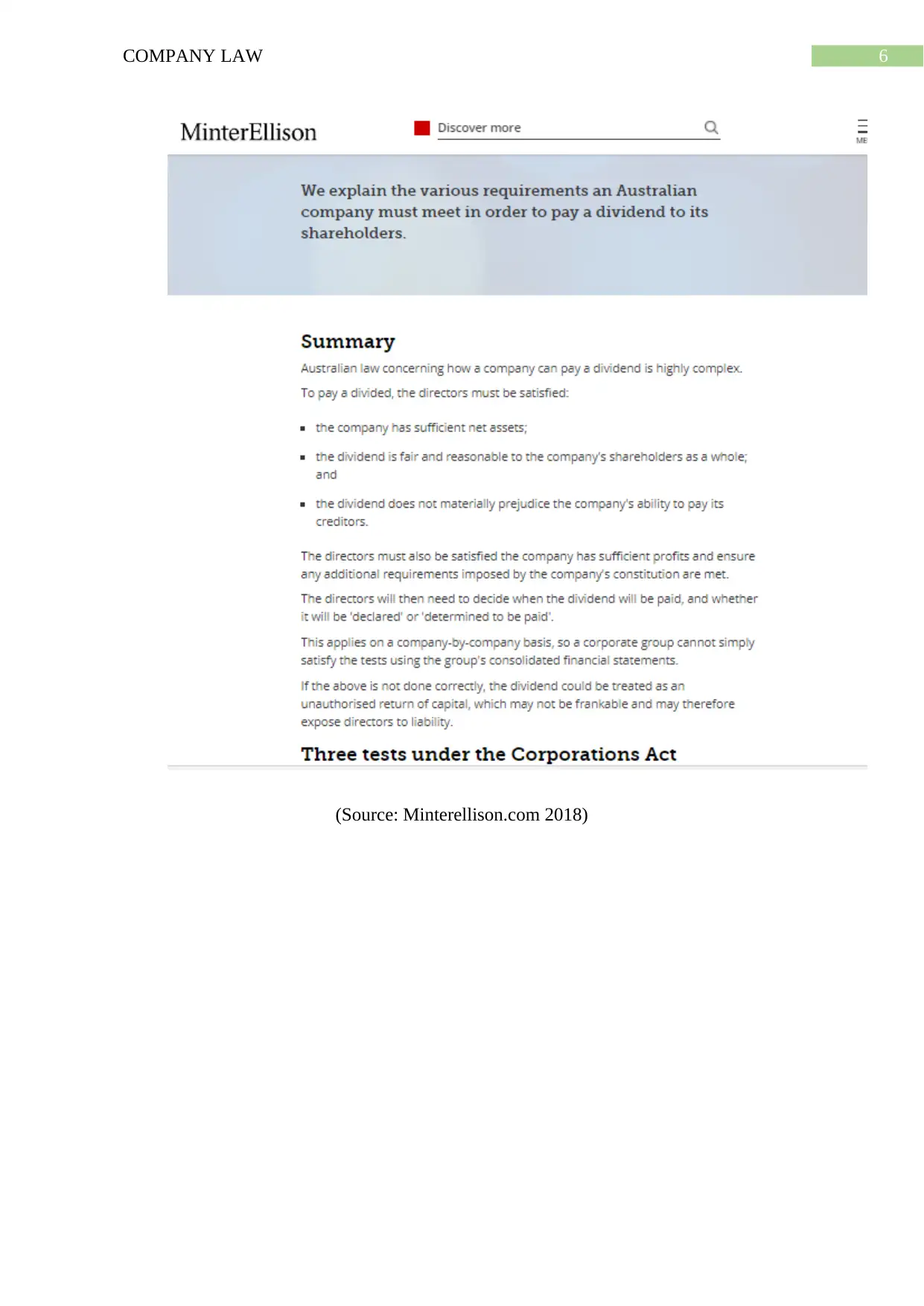
6COMPANY LAW
(Source: Minterellison.com 2018)
(Source: Minterellison.com 2018)
Paraphrase This Document
Need a fresh take? Get an instant paraphrase of this document with our AI Paraphraser
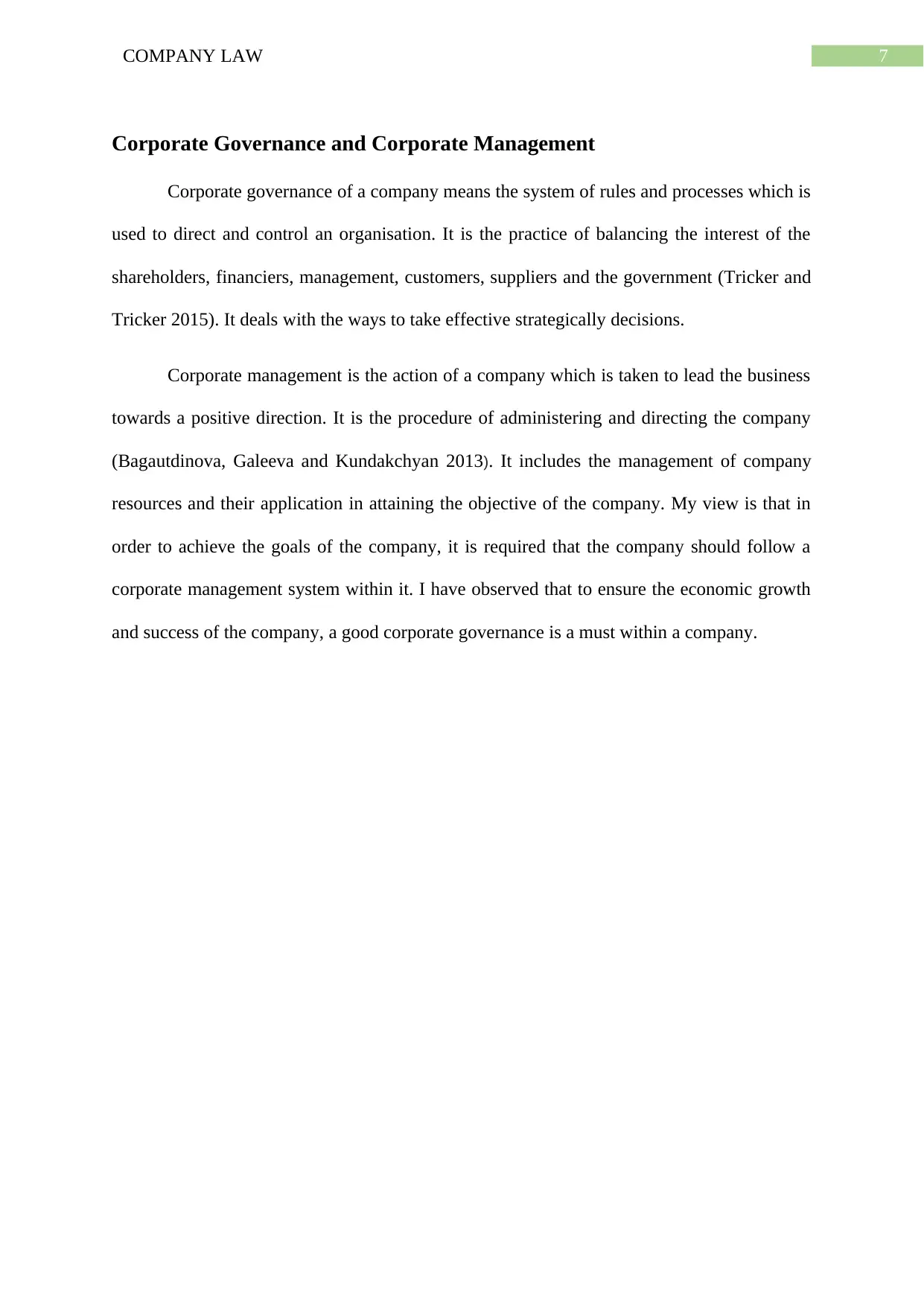
7COMPANY LAW
Corporate Governance and Corporate Management
Corporate governance of a company means the system of rules and processes which is
used to direct and control an organisation. It is the practice of balancing the interest of the
shareholders, financiers, management, customers, suppliers and the government (Tricker and
Tricker 2015). It deals with the ways to take effective strategically decisions.
Corporate management is the action of a company which is taken to lead the business
towards a positive direction. It is the procedure of administering and directing the company
(Bagautdinova, Galeeva and Kundakchyan 2013). It includes the management of company
resources and their application in attaining the objective of the company. My view is that in
order to achieve the goals of the company, it is required that the company should follow a
corporate management system within it. I have observed that to ensure the economic growth
and success of the company, a good corporate governance is a must within a company.
Corporate Governance and Corporate Management
Corporate governance of a company means the system of rules and processes which is
used to direct and control an organisation. It is the practice of balancing the interest of the
shareholders, financiers, management, customers, suppliers and the government (Tricker and
Tricker 2015). It deals with the ways to take effective strategically decisions.
Corporate management is the action of a company which is taken to lead the business
towards a positive direction. It is the procedure of administering and directing the company
(Bagautdinova, Galeeva and Kundakchyan 2013). It includes the management of company
resources and their application in attaining the objective of the company. My view is that in
order to achieve the goals of the company, it is required that the company should follow a
corporate management system within it. I have observed that to ensure the economic growth
and success of the company, a good corporate governance is a must within a company.

8COMPANY LAW
(Source: Abc.net.au 2018).
(Source: Abc.net.au 2018).
⊘ This is a preview!⊘
Do you want full access?
Subscribe today to unlock all pages.

Trusted by 1+ million students worldwide
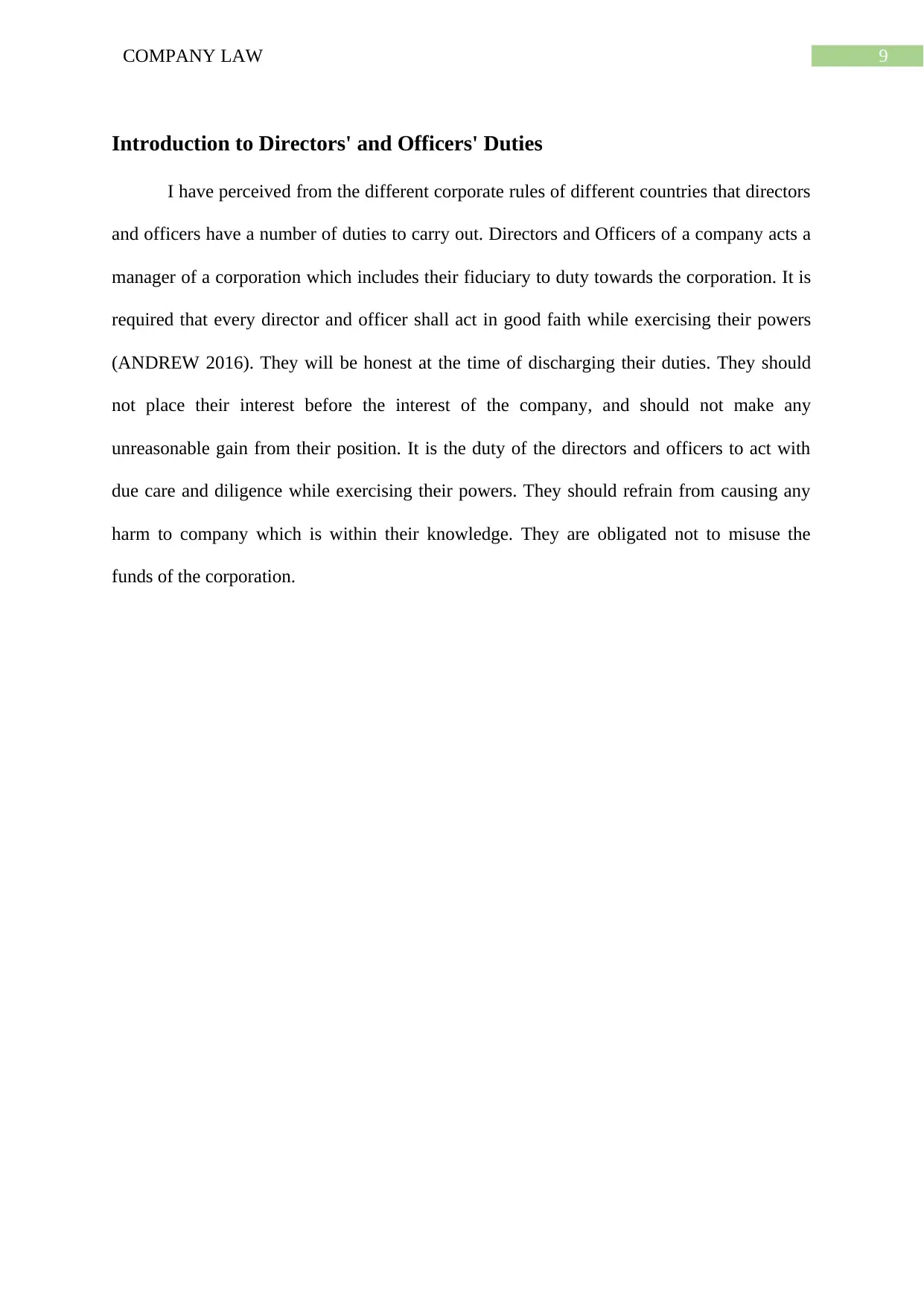
9COMPANY LAW
Introduction to Directors' and Officers' Duties
I have perceived from the different corporate rules of different countries that directors
and officers have a number of duties to carry out. Directors and Officers of a company acts a
manager of a corporation which includes their fiduciary to duty towards the corporation. It is
required that every director and officer shall act in good faith while exercising their powers
(ANDREW 2016). They will be honest at the time of discharging their duties. They should
not place their interest before the interest of the company, and should not make any
unreasonable gain from their position. It is the duty of the directors and officers to act with
due care and diligence while exercising their powers. They should refrain from causing any
harm to company which is within their knowledge. They are obligated not to misuse the
funds of the corporation.
Introduction to Directors' and Officers' Duties
I have perceived from the different corporate rules of different countries that directors
and officers have a number of duties to carry out. Directors and Officers of a company acts a
manager of a corporation which includes their fiduciary to duty towards the corporation. It is
required that every director and officer shall act in good faith while exercising their powers
(ANDREW 2016). They will be honest at the time of discharging their duties. They should
not place their interest before the interest of the company, and should not make any
unreasonable gain from their position. It is the duty of the directors and officers to act with
due care and diligence while exercising their powers. They should refrain from causing any
harm to company which is within their knowledge. They are obligated not to misuse the
funds of the corporation.
Paraphrase This Document
Need a fresh take? Get an instant paraphrase of this document with our AI Paraphraser
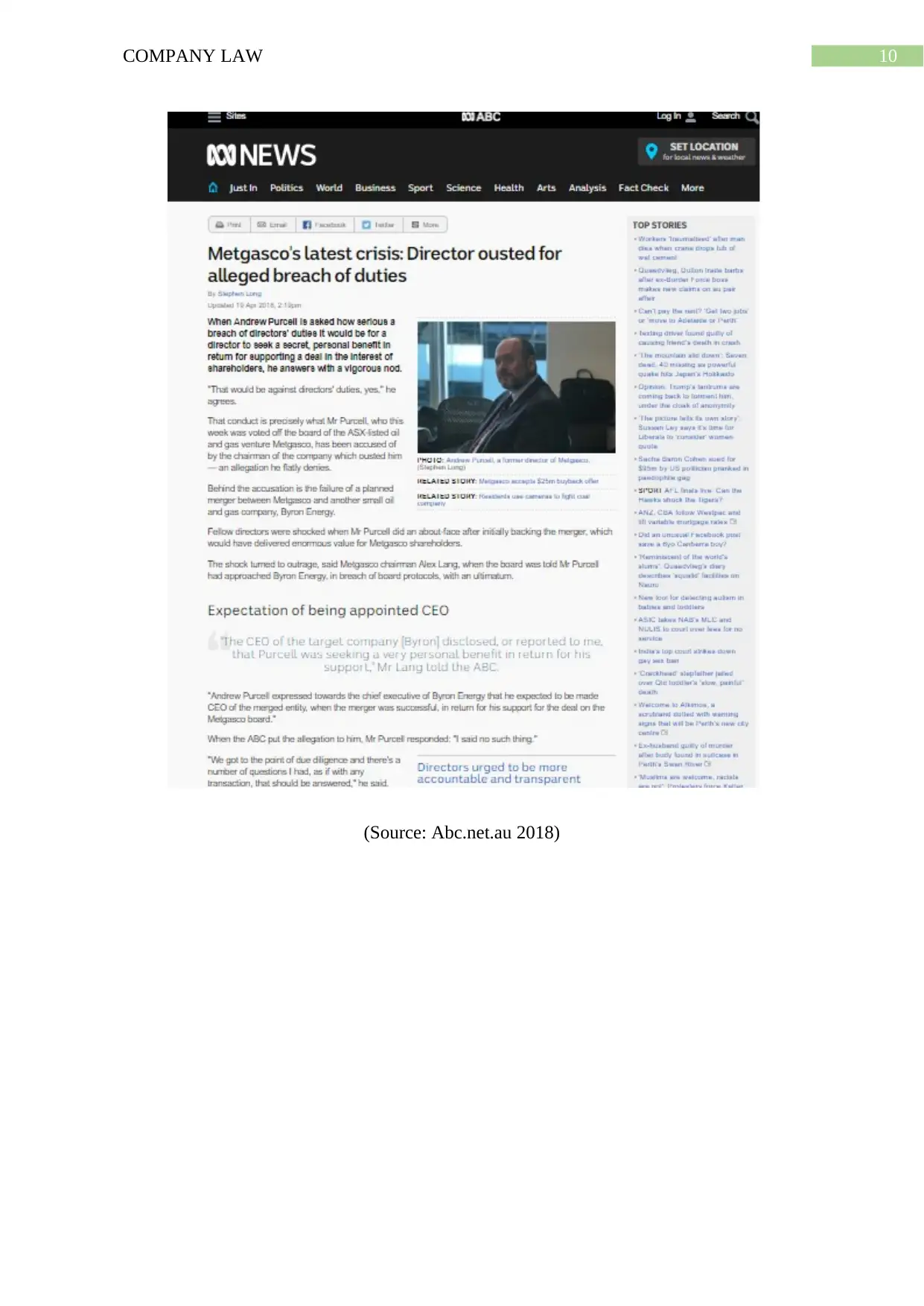
10COMPANY LAW
(Source: Abc.net.au 2018)
(Source: Abc.net.au 2018)
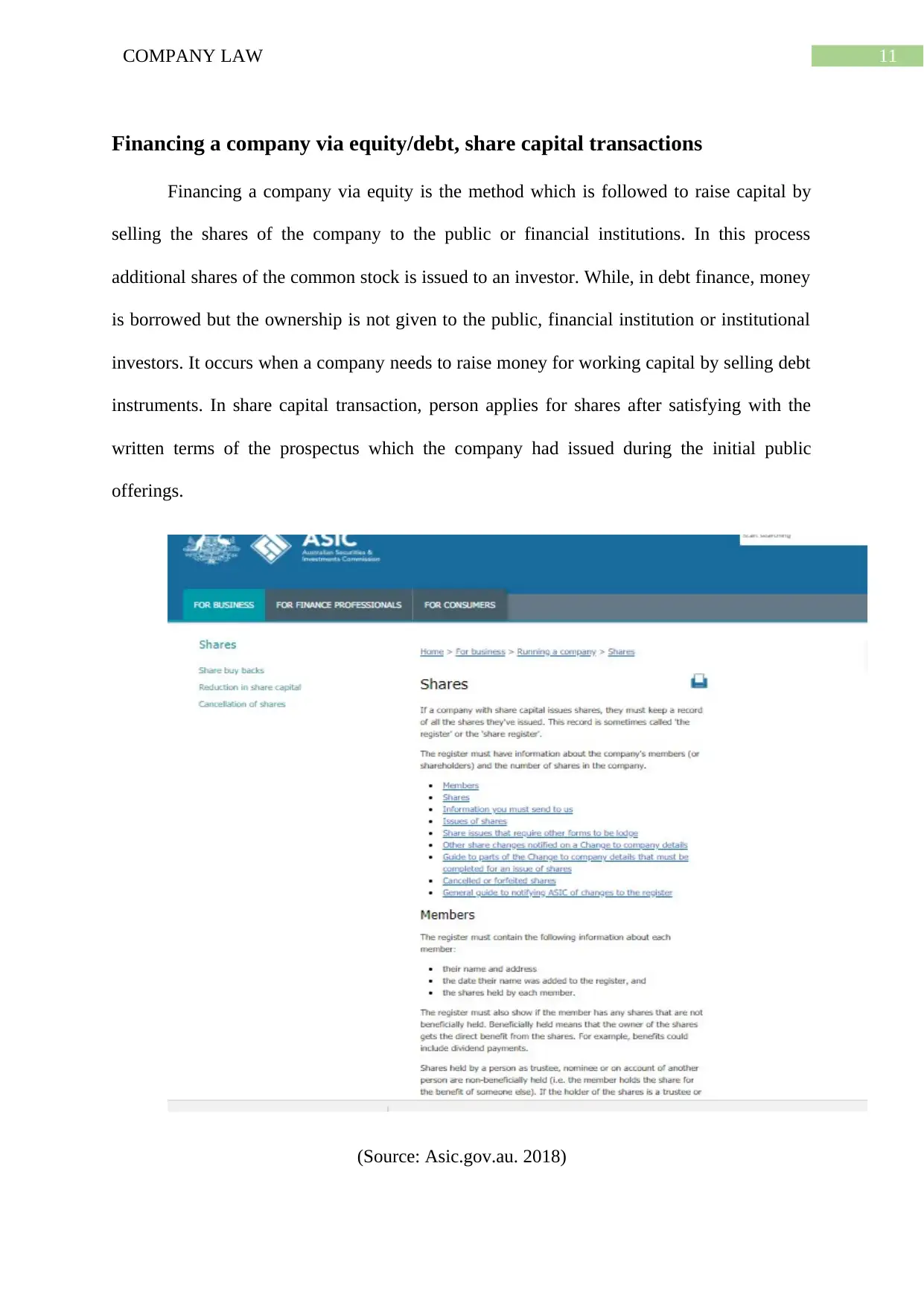
11COMPANY LAW
Financing a company via equity/debt, share capital transactions
Financing a company via equity is the method which is followed to raise capital by
selling the shares of the company to the public or financial institutions. In this process
additional shares of the common stock is issued to an investor. While, in debt finance, money
is borrowed but the ownership is not given to the public, financial institution or institutional
investors. It occurs when a company needs to raise money for working capital by selling debt
instruments. In share capital transaction, person applies for shares after satisfying with the
written terms of the prospectus which the company had issued during the initial public
offerings.
(Source: Asic.gov.au. 2018)
Financing a company via equity/debt, share capital transactions
Financing a company via equity is the method which is followed to raise capital by
selling the shares of the company to the public or financial institutions. In this process
additional shares of the common stock is issued to an investor. While, in debt finance, money
is borrowed but the ownership is not given to the public, financial institution or institutional
investors. It occurs when a company needs to raise money for working capital by selling debt
instruments. In share capital transaction, person applies for shares after satisfying with the
written terms of the prospectus which the company had issued during the initial public
offerings.
(Source: Asic.gov.au. 2018)
⊘ This is a preview!⊘
Do you want full access?
Subscribe today to unlock all pages.

Trusted by 1+ million students worldwide
1 out of 15
Related Documents
Your All-in-One AI-Powered Toolkit for Academic Success.
+13062052269
info@desklib.com
Available 24*7 on WhatsApp / Email
![[object Object]](/_next/static/media/star-bottom.7253800d.svg)
Unlock your academic potential
Copyright © 2020–2025 A2Z Services. All Rights Reserved. Developed and managed by ZUCOL.





